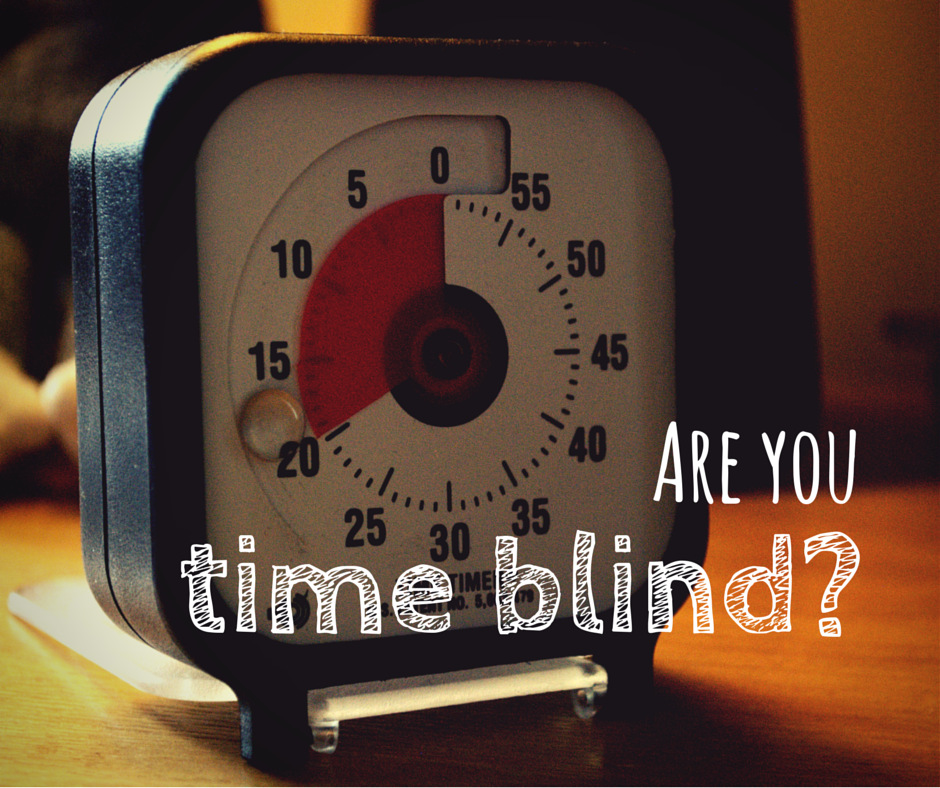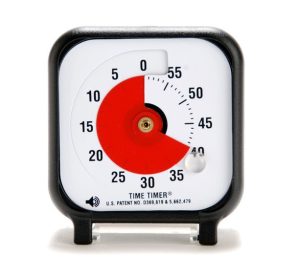Are you (or someone you love) always late?
I don’t just mean running 10 minutes late for a meeting, I mean persistently late. For everything.

Late getting out of bed. Late getting into bed (sometimes to the point of never getting into bed). Late sitting down for dinner with your family. Late leaving the office, putting down the video game controller, or getting the baby from her nap.
Or maybe you do okay in these areas. Maybe you’re exhausted by larger-than-life emotions that, while quickly forgotten after the fact, feel all-consuming in the moment.
There’s a name for this: time blindness.
And while you might not believe me yet, there’s hope.
The truth about time blindness.
 Photo by nicksarebi
Photo by nicksarebi 
Time blindness isn’t just a matter of ‘feeling like’ time is moving quickly or slowly. It’s a failure to view time as linear, concrete, or even finite.
This means most traditional time management strategies won’t work for most ADHD’ers. It doesn’t mean we’re not responsible for how we manage and deal with our ADHD — including our distorted perception of time.
Learning to manage time is one of the best investments you can make in your relationship with yourself and others.
Time blindness & you.
Time blindness manifests differently in everyone, just like ADHD itself. In other words, it’s more complicated than “she always gets out the door late” or “he’s unreliable.”
After my first week on stimulant medication, I wrote the following revelation in my journal: “a week is only a week long.” Obvious? Hardly. I’d never perceived an emotional state, a rough day, or even being unbearably hungry as something with a beginning, a middle, and an end. If you suffer from wild, all-consuming emotions — positive or negative — training your brain to perceive time more accurately can provide significant relief.
Time blindness often causes time to ‘get away’ from people with ADHD. As one ADHD’er put it in an ADDitude discussion thread: ‘I have helpful friends who say, “just look at your watch and leave when it is 3:00 p.m.’ But when I look at my watch, it is 4:30 p.m.!”
For my husband, time blindness shows up in the form of marathon work days, late bedtimes, and plenty of household projects that he “didn’t intend to take all day.”
Time blindness can hurt. It can make those on the receiving end feel confused, disrespected, angry, unimportant, and betrayed. But before you lash out at someone who has broken a social contract (again) by mismanaging their time, remember: it’s not about you. It doesn’t reflect on how important the obligation actually was to them. When a loved one says, “I have no idea why I keep doing this,” they’re telling the truth. They feel every bit as let down as you do.
The only answer is education (for all parties involved), forgiveness, and a lot of patience and compassion.
Finding information and advice.

I’m pleased to have found — and to be able to share with you — this free podcast with Dr. Ari Tuckman, author of More Attention, Less Deficit and Understand Your Brain, Get More Done. Dr. Tuckman is approachable and to the point, giving some much-needed information and advice about one of ADHD’s more confounding facets.
Don’t skip the listener comments and questions, either. I found their stories of success and defeat very therapeutic and I suspect many others will, too.
Before you run off and listen to the podcast, here’s a tip from our home to yours: do everything you can to represent time visually. My husband insists he actually reads analog clocks more quickly and easily than digital, and that’s not surprising. Analog clocks quantify time — especially for visually-oriented people — in a way digital cannot.
Likewise, timer apps like Ovo Timer (free, Android-only) or Time Timer ($0.99 Android, $2.99 iOS) start with a chunk of color that gradually disappears. You can also buy standalone Time Timer clocks to keep around the house.
I’m already teaching my two-year-old about time with the Time Timer when we clean up his toys at night. We don’t talk much about numbers, but he understands that when the red wedge disappears, he’s supposed to be ready to move on to the next task.
Do you struggle with lateness or with time ‘getting away from you?’ What are some strategies you’ve tried?
Hey there! Are you enjoying The ADHD Homestead?
Here's the thing: I don't like ads. I don't want to sell your attention to an advertising service run by the world's biggest data mining company. I also value my integrity and my readers' trust above all, which means I accept very few sponsorships/partnerships.
So I'm asking for your support directly. For the cost of one cup of coffee, you can help keep this site unbiased and ad-free.
Below you will find two buttons. The first lets you join our crew of Patreon pals and pledge monthly support for my work. Patrons also have access to my Audioblogs podcast. The second takes you to a simple donation page to pledge one-time or recurring support for The ADHD Homestead, no frills, no strings. Do whichever feels best for you!

